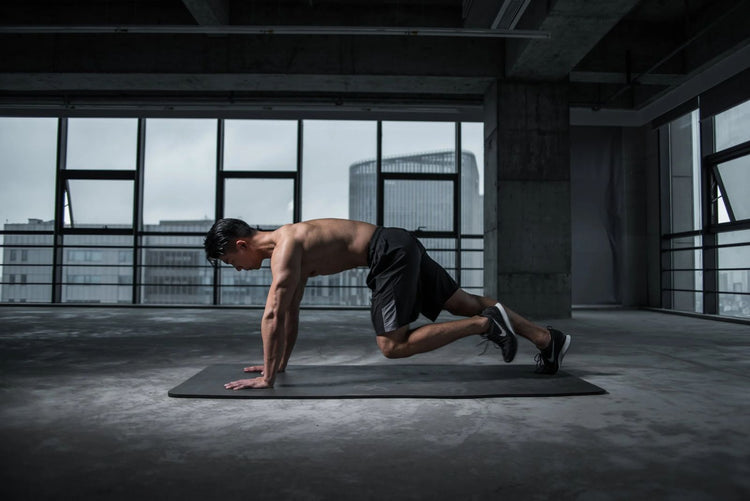It’s normal to break a sweat when you work out, but it can make your training session miserable when it's excessive. You don’t want sweat dripping down your back or into your eyes, a slippery grip, or sweat marks on your clothing.
Sweat is necessary to cool your body down, but it is possible to sweat too much. Here’s everything you need to know about sweating during your workouts, what causes it, and what options you have.
“Many people sweat profusely during a workout. Some may sweat more than others because of their level of exertion, clothing choices, or indoor or outdoor temperatures.”
Why Do I Sweat So Much When I Workout?
The amount you sweat depends on several factors, including:
- How hard you work out
- Weather conditions
- Genetics
- Your fitness level
- Health conditions
- Where you exercise
Many people sweat profusely during a workout. Some may sweat more than others because of their level of exertion, clothing choices, or indoor or outdoor temperatures.
However, some people have hyperhidrosis, which can cause excessive sweating. People with this condition don’t have more sweat glands than others. Their excess sweat comes from the sympathetic nerve, which controls sweating, being oversensitive.
Hyperhidrosis affects about 4.8 percent of Americans, though it could be higher. It can be primary, often hereditary, and occurs on the hands, feet, underarms, face, and head. It typically begins in childhood.
Another condition causes secondary hyperhidrosis and typically begins in adulthood. It may occur all over the body or only in one area. Some conditions that cause excessive sweating include thyroid problems, diabetes, menopause, hot flashes, low blood sugar, nervous system disorders, and gout.
Why Do We Sweat?
Sweating is a natural process that the body uses to cool itself down. Sweat is released through glands on your skin and evaporates into the air. This has the effect of cooling down your skin and body.
The human body has two types of sweat glands:
- Eccrine sweat glands are found all over the body, although they’re mainly on the palms of the hands, the soles of the feet, and the forehead. They regulate body temperature – thermoregulation – by producing a lightweight, odorless sweat.
- Apocrine sweat glands are glands that open into the hair follicles and lead to the skin's surface. These sweat glands are found in areas with a lot of hair follicles, such as the armpits, groin, and scalp. These sweat glands produce more concentrated secretions and are often associated with body odor.
Is Sweating Good for You?
Sweating may not feel great, but it’s essential to your body’s thermoregulation and helps you avoid overheating in high temperatures or during an intense workout. Your body heats up and then produces sweat to reduce your body temperature.
Some people don’t sweat as much. Also, being dehydrated can cause you to sweat less. Sweat is primarily composed of water, so not having enough in your system means your body can’t sweat properly. While this may be more comfortable, it’s not healthy or safe.
How to Avoid Excessive Sweat at the Gym
Excess sweating is not only uncomfortable while you’re trying to stay motivated during the workout, but it can be embarrassing. Fortunately, there are ways you can avoid excess sweat and keep yourself more comfortable.
Your first line of defense if you sweat profusely during workouts is a good antiperspirant. Apply it under your arms, on your hands, on your feet, and around your hairline.
Here are some other steps to take to manage your sweat levels while exercising:
- Choose workout gear from lightweight, breathable fabrics like cotton or sweat-wicking materials.
- Apply powder to areas that sweat a lot, like your hands, feet, groin, and under the breasts.
- Avoid exercising in the heat. Try to work out in the morning or evening instead.
- Control the room temperature and humidity if you’re exercising indoors. Contrary to popular belief, you don’t need to break a sweat to get a good workout.
- Stay hydrated by drinking water before, during, and after you exercise.
- Switch to a higher strength or prescription deodorant.
Another critical aspect of avoiding excess sweat while working out is wearing the proper clothing. Sweat-wicking fabric and apparel, especially sweat-wicking workout clothes, are designed to pull moisture from the body, through the fabric, and to the outer surface to allow it to evaporate. This helps you stay calm, even if you’re doing an intense workout and sweating.
Some of the best sweat-wicking clothes are made of nylon, polyester, polypropylene, wool, and silk. Depending on your sweat level, consider sweat-wicking shirts, a sweat-wicking bra, and sweat-wicking underwear to avoid excess sweat all over your body.

